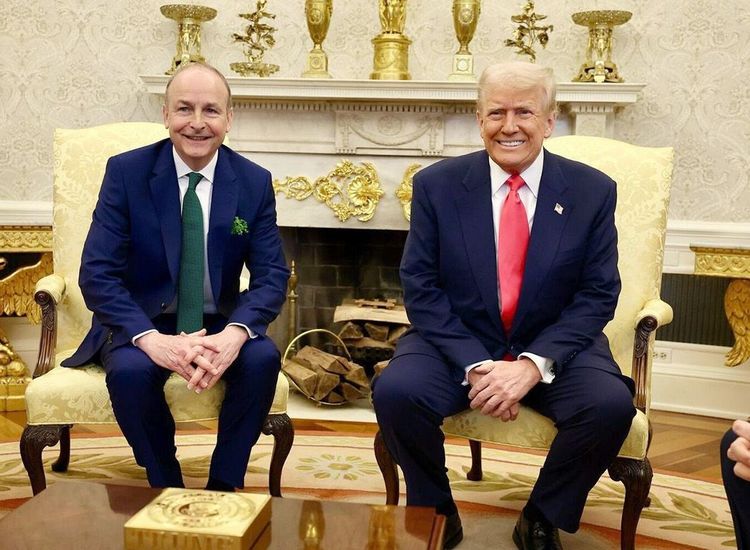By Orla O’Sullivan
Brían F. O’Byrne, the Cavan native and longtime L.A. resident, is back in New York for a play, which is funny because he gave up on theater five years ago.
Then 40, the decorated actor had finished the role of Alexander Herzen, the central figure of Tom Stoppard's trilogy “The Coast of Utopia,” an eight-hour marathon that played at Lincoln Center. As he said, “When you’ve played the lead in a Tom Stoppard play that has received more Tonys than any play in history and you’re feeling incredibly empty, there’s something wrong.”
There’s a perception that actors pass on theater for better money in movies, but O’Byrne said, no, “There’s no money in movies.”
His issue with theaters is that they too often pander to the audience, he suggested. Realizing, “I’ve fallen out of love with theater; it doesn’t surprise me much,” he sought a new path.
“I’m now interested in reaching people in a completely different way,” he said, giving as an example his work with Outside The Wire, a Brooklyn group that reads translations of ancient Greek plays to the troops. With war and torture among the subject matter, it leads to
frank discussion of issues such as post-traumatic stress disorder with the audience.
“It’s powerful, unlike anything I’ve experienced before,” he said, adding, that he has performed in this Theater of War series twice in
Guantanamo and once to troops in Kuwait.
“I’d love to bring it to Northern Ireland and sit down loyalists, republicans, prison guards—some in Guantanamo had just come off their shifts when we did [a play about the tortured character] Prometheus.”
O’Byrne has also read from “Rum and Vodka,” an early Conor McPherson play, to young Marines who very much relate to its theme of alcohol abuse, he said.
He poses a rhetorical question: “Do you have an effect on anything? That’s the only thing of value.”
The play he wrapped up last Sunday after an extended run drew him back to the stage “for a bunch of reasons,” he said.
Among them was the theme of global warming at the core of the oddly named play, “If There Is I Haven’t Found It Yet.” Fittingly, for a play that ran in New York during Hurricane Sandy, the characters end up ankle-deep in water. Despite his own skepticism that his work could make a difference, O’Byrne said he was gratified that “two friends bought hybrid cars after seeing the show.”
Other reasons O’Byrne said he took on his first theater role in five years were his admiration for his co-star Jake Gyllenhaal (who played opposite Heath Ledger in "Brokeback Mountain") and the playwright Nick Payne, who just won best British play of the year for another of his science-oriented works, “Constellations.”
All this, plus the interest of his wife, actress Heather Goldenhersh, in possibly moving back to the East Coast, led him to take the “financial hit” entailed in relocating the family for five months.
O’Byrne and Goldenhersh met on stage in “Doubt,” a 2005 Pulitzer- and Tony-winning play that questions whether a priest, played by O’Byrne, is a child molester. He won the Drama Desk award for Outstanding Actor, having won the Tony for Best Featured Actor in a Play the previous year for “Frozen.”
“Theater is there to challenge people,” he said, but questions whether that’s possible under the Broadway model, whereby most theaters rely on subscribers, typically older and conservative. In return for an annual membership fee, subscribers get a certain number of theater tickets per year. “People in New York don’t know what they’re coming to see -- they just know it’s the third Tuesday and they have tickets,” he said.
There’s little real exchange between audiences and actors, he said, adding, “Theater is also constrained because it’s in a theater.” In sum, a shrinking conversation? He agreed, “That’s a good way to put it”.
He also agreed with the view that it is on TV, not on stage or in movies, where much of the most creative work is being done—specifically cable TV. “There, it’s the opposite of theater: subscribers expect shows to be risky,” he said.
Although O’Byrne has a huge body of stage work since he first drew attention in his 1996 role as Pato Dooley in “The Beauty Queen of Lenane,” he has also been in movies, such as “Million Dollar Baby,” and on TV shows, including “Mildred Pierce” and a U.S./NYPD version of “Prime Suspect,” which NBC axed earlier this year. “It would have been better if our show wasn’t called ‘Prime Suspect,’” he said, “because it was totally different.”
Detective Reg Duffy, aka O’Byrne, was tracked down by the Echo with some difficulty, in the absence of a website. His views on celebrity are also somewhat contrarian: “Publicity is for sexy young things. I was never a sexy young thing.”
As for Gyllenhaal, an A-list movie star, who was O’Byrne’s counterpart in the Payne play, O’Byrne said, “Jake did 187 interviews in three days.” Each reporter was allotted three to five minutes. “It’s just madness.”
It struck him much as did watching the surveillance personnel peering constantly into Guantanamo prisoners’ cells to avert suicide. “It’s like a Beckett play, forcing you to ask, ‘How do two people end up in this situation?’”
And as for we two Paddies, far from home, sitting across from each other, O’Byrne, though cordial, is not interested in playing the Irish card. Despite his Gaelic name, Claddagh ring and professed love of brown bread, O’Byrne, said, “There comes a point where you stop telling your story about where you’re from.”
Though being from Ireland has its advantages, he admitted, smiling. “My ma came over recently and we had lunch at the White House --nothing to do with my achievements, just that [Dublin-born] Samantha Power [special assistant to President Obama] is a friend of mine.”








